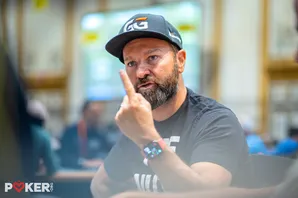A Nevada House measure that seeks to create a publicly accessible "black book" of cheaters banned from the state's online poker sites has received pushback from the sole company that would be affected by such a black book's creation at the present time. Officials for Caesars Entertainment, the parent company of WSOP.com, appeared before Nevada's Assembly Judiciary Committee on Wednesday to protest the measure.
Two weeks ago, the Judiciary Committee created Assembly Bill 380, which would force Caesars and WSOP.com to forward the full name, date of birth, and gaming account name of any player suspended or banned from a Nevada-licensed online poker site to the Nevada Gaming Commission, for review and possible inclusion on a newly created blacklist.
Caesars moved quickly to get its opposition to such an online-poker blacklist on the record. Caesars lobbyist Mike Alonso and WSOP operator Caesars Digital VP Danielle Barille, spoke to the committee on why Caesars believes the online poker black book would place an unfair burden on the company.
Caesars and WSOP.com do “everything reasonably possible to keep bad actors off the [online poker] site," Alonso said. The lobbyist described the committee's goal as admirable but warned that such a black book could expose Caesars to "expensive and burdensome litigation for damaging someone's reputation or from players who think that they lost money to an alleged cheater and want compensation."
Ausmus-Strauss online-bracelet event saga illustrates situation
The second part of that Alonso statement may be more telling than the first. Allegations regarding various forms of cheating on WSOP.com have circulated for years, as they have on virtually every online poker site, whether regulated or not. However, a high-profile incident in a WSOP online-bracelet event involving five-time bracelet winner Jeremy Ausmus and a relative unknown, Jared "jstrizza" Strauss. The saga centered on Ausmus's public accusations against Strauss, whose account on WSOP.com Ausmus alleged was being used surreptitiously by another, more accomplished player.
The event involving Ausmus and Strauss isn't the online WSOP.com bracelet tourney where such allegations have surfaced. Yet Ausmus reported that Strauss's account had been banned by Caesars -- which Strauss himself confirmed, while protesting his innocence -- but that no adjustment in payouts had taken place:
Ausmus took the situatiion to Twitter with posts such as this:
Conundrum: 'Player v Player' different than 'Player v House'
Alonso and Barille also asserted that Caesars and WSOP.com already take measures to prevent cheating on WSOP.com, including advanced algorithms designed to catch RTA (real-time aid by computer software) at the tables.
However, Caesars' continuing stance that online cheaters' identifies should remain private ignores a core difference between poker and all other casino games. With the exception of poker, all other forms of casino gambling pit the player against the house (the casino), which gives casinos every incentive to safeguard against cheating gamblers.
In contrast, poker is a player-versus-player game, with the house taking the same rake or administrative fee regardless of who walks away from the table with the money. Yet casinos and card rooms, whether live or online, still have incentives to assure their games are as fair as possible, especially in a reputational sense.
Besides some security and administrative expense it's not the casino that bears the cost of poker cheating; that burden is instead placed on the victimized players. And that's what AB 380 seeks to address, because in Nevada, at the present time, cheated players have no financial recourse. Caesars' and WSOP.com's protests make perfect business sense, but they do not address consumers' interests or rights.
That issue was brought up by Sara Cholhagian Ralston. Ralston, a semi-pro poker player herself, helped draft AB 380 and has already announced an amendment to the bill to address some of the casino's concern over liability issues. Ralston worked with several Assembly members in drafting the bill.
Yet there's little doubt that Ralston believes clamping down on online cheaters in a public way serves the greater need. “I'd like to remind this committee that this is for real money," Ralston said. "Poker players have a livelihood that they need to maintain. In the online poker world, we don't have that level of transparency. You don't know who you’re playing against. [We need] to have that type of information that's relevant so a player can decide who to play with and who we don't want to play with.”
Featured image source: WSOP.com


















